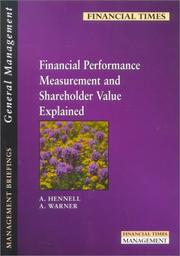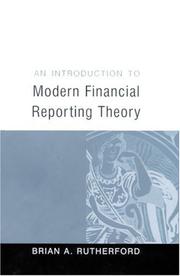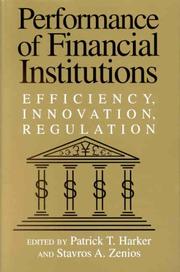| Listing 1 - 10 of 667 | << page >> |
Sort by
|

ISBN: 0787947865 Year: 2000 Publisher: San Francisco, Calif. Jossey-Bass
Abstract | Keywords | Export | Availability | Bookmark
 Loading...
Loading...Choose an application
- Reference Manager
- EndNote
- RefWorks (Direct export to RefWorks)

ISBN: 0415240964 Year: 2000 Publisher: London : Routledge,
Abstract | Keywords | Export | Availability | Bookmark
 Loading...
Loading...Choose an application
- Reference Manager
- EndNote
- RefWorks (Direct export to RefWorks)

ISBN: 027363576X Year: 2000 Publisher: London Financial Times Management
Abstract | Keywords | Export | Availability | Bookmark
 Loading...
Loading...Choose an application
- Reference Manager
- EndNote
- RefWorks (Direct export to RefWorks)
Digital
Abstract | Keywords | Export | Availability | Bookmark
 Loading...
Loading...Choose an application
- Reference Manager
- EndNote
- RefWorks (Direct export to RefWorks)
Book
ISBN: 2111150835 Year: 2000 Publisher: Paris Assemblée nationale
Abstract | Keywords | Export | Availability | Bookmark
 Loading...
Loading...Choose an application
- Reference Manager
- EndNote
- RefWorks (Direct export to RefWorks)
Book
Year: 2000 Publisher: San Jose, Calif.
Abstract | Keywords | Export | Availability | Bookmark
 Loading...
Loading...Choose an application
- Reference Manager
- EndNote
- RefWorks (Direct export to RefWorks)
Book
Abstract | Keywords | Export | Availability | Bookmark
 Loading...
Loading...Choose an application
- Reference Manager
- EndNote
- RefWorks (Direct export to RefWorks)
Macroeconomic variables and changes in foreign reserves affect the secondary market price of Brady bonds in Bulgaria. So do changes in the external environment, including crises in other parts of the world. - To analyze the main determinants of secondary market prices of Bulgarian Brady bonds, Budina and Mantchev investigate to what extent fluctuations in domestic fundamentals affect the bonds' secondary market price. They also assess the extent to which external shocks affect the bonds' prices. They estimate the long-term relationship between domestic fundamentals and market prices of the bonds, using cointegration techniques. In the long run, they find that gross foreign reserves and exports had a positive effect on bond prices and the real exchange rate and Mexico's nominal exchange rate depreciation had a negative effect. In the short run, the Asian crisis had a negative impact, and Bulgaria's change in political regime and introduction of a currency board had a positive impact. Mexico's economic crisis in 1995 had contagion effects. The authors' empirical results confirm the view that the so-called fundamentals approach should be used to supplement the analysis of spillover effects for Bulgarian Brady bonds. This paper - a product of Macroeconomics and Growth, Development Research Group - is part of a larger effort in the group to study transition economies. The authors may be contacted at nbudina@worldbank.org or tmantchev@hotmail.com.
Book
Abstract | Keywords | Export | Availability | Bookmark
 Loading...
Loading...Choose an application
- Reference Manager
- EndNote
- RefWorks (Direct export to RefWorks)
Macroeconomic variables and changes in foreign reserves affect the secondary market price of Brady bonds in Bulgaria. So do changes in the external environment, including crises in other parts of the world. - To analyze the main determinants of secondary market prices of Bulgarian Brady bonds, Budina and Mantchev investigate to what extent fluctuations in domestic fundamentals affect the bonds' secondary market price. They also assess the extent to which external shocks affect the bonds' prices. They estimate the long-term relationship between domestic fundamentals and market prices of the bonds, using cointegration techniques. In the long run, they find that gross foreign reserves and exports had a positive effect on bond prices and the real exchange rate and Mexico's nominal exchange rate depreciation had a negative effect. In the short run, the Asian crisis had a negative impact, and Bulgaria's change in political regime and introduction of a currency board had a positive impact. Mexico's economic crisis in 1995 had contagion effects. The authors' empirical results confirm the view that the so-called fundamentals approach should be used to supplement the analysis of spillover effects for Bulgarian Brady bonds. This paper - a product of Macroeconomics and Growth, Development Research Group - is part of a larger effort in the group to study transition economies. The authors may be contacted at nbudina@worldbank.org or tmantchev@hotmail.com.

ISBN: 0761966072 Year: 2000 Publisher: London P. Chapman Pub.
Abstract | Keywords | Export | Availability | Bookmark
 Loading...
Loading...Choose an application
- Reference Manager
- EndNote
- RefWorks (Direct export to RefWorks)

ISBN: 0521777674 Year: 2000 Publisher: Cambridge Cambridge University Press
Abstract | Keywords | Export | Availability | Bookmark
 Loading...
Loading...Choose an application
- Reference Manager
- EndNote
- RefWorks (Direct export to RefWorks)
| Listing 1 - 10 of 667 | << page >> |
Sort by
|

 Search
Search Feedback
Feedback About UniCat
About UniCat  Help
Help News
News